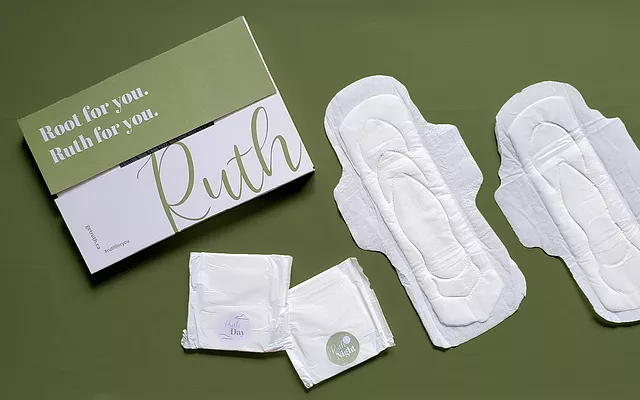A product created in Alberta hopes to reduce plastic waste

Founded by a pair of students from the University of Alberta, Ruth Pads, a menstrual product, is made from 93 per cent plant-based materials.
Ruth was founded by Nicole Sanchez and Anka Chan, who initially developed the pads as a project while they were students. The concept came after they realized how much plastic they were throwing away by using disposable menstrual pads.
Studies by The European Commission found that discarded menstrual products, like pads and tampons, are the 5th most common plastic waste product found in the ocean.
The company Flo reported that over a single menstruating person’s life they use between five and 10,000 pads and tampons. This adds up to as much as 300 pounds of plastic.
“There really weren’t any pads out there that were good for the environment, but also worked with our schedules and budgets as students,” explained Sanchez.
Ruth conducted a survey of 120 menstruators and found that 70% of participants said they were also frustrated with the lack of sustainable options and were searching for alternative hygiene products.
According to UK based organization Friends of the Earth, traditional pads are 90% plastic and 10% cotton. This means that one pad contains the same amount of plastic as 4 plastic shopping bags.
“We initially were going to manufacture them out of hemp, but we’ve switched to kenaf, which is another plant based material,” she added.
Traditional menstrual pads can take as long as 800 years to decompose. Being manufactured from kenaf means that Ruth products are biodegradable.
“While there are products like washable cloth pads and menstrual cups, Ruth’s pads are disposable and convenient to use,” Sanchez said.
The only part of Ruth’s made from plastic is the packaging, Sanchez says that’s one of the things they are working to improve with their kickstarter.
As well as finding alternative wrapping, they are also working to support people experiencing ‘period poverty’ in several Canadian cities.
Women’s College Hospital (WCH) defines ‘period poverty’ as the inability to afford basic menstrual hygiene products. They found that in Northern and remote communities, the price of a box of tampons is often doubled relative to urban areas.
“Something that a lot of people don’t realize is that one in three menstruating people in Canada struggle to afford pads or tampons,” Sanchez explained.
WCH reported that the expense of these products has the greatest impact on low income, underhoused, and vulnerable people, often causing them to miss school or work because of compounding existing stressors.
Through their kickstarter you are able to make a pledge to one of the following six Canadian women’s shelters:
Moon Time Sisters in North Vancouver, BC
All Cycles YEG in Edmonton, AB
Chez Doris in Montréal, QC
St. John’s Women’s Centre of St. John’s, NL
Shepherds of Good Hope in Ottawa, ON
International Women of Saskatoon (IWS) in Saskatoon, SK
“We’re also working with the University of Alberta Students’ Union, to become the main supplier to provide free menstrual products on campus,” Sanchez said.
The company is named after the late Ruth Bader Ginsburg.
“She was such a pioneer for gender equality, so it only seemed right,” Sanchez explained. “Through partnerships with different organizations as well as various initiatives, Ruth is dedicated to making ‘period poverty’ a thing of the past,” she says.
Previous Story
- Actress Emma Watson and Twitter’s cofounder back startup...
- New technology converts waste plastics to jet fuel...
- The Near Future Looks Bright for Infinitely Recyclable...
- Matawan Residents Can Start Recycling Plastic Bags Tuesday
- Could we recycle plastic material bags into fabrics...
- Techmer PM Introduces Improved Pigment for the Sorting...
- Virginia moves nearer to ban plastic foam containers
- Chemicals in plastics damage babies' brains and should...